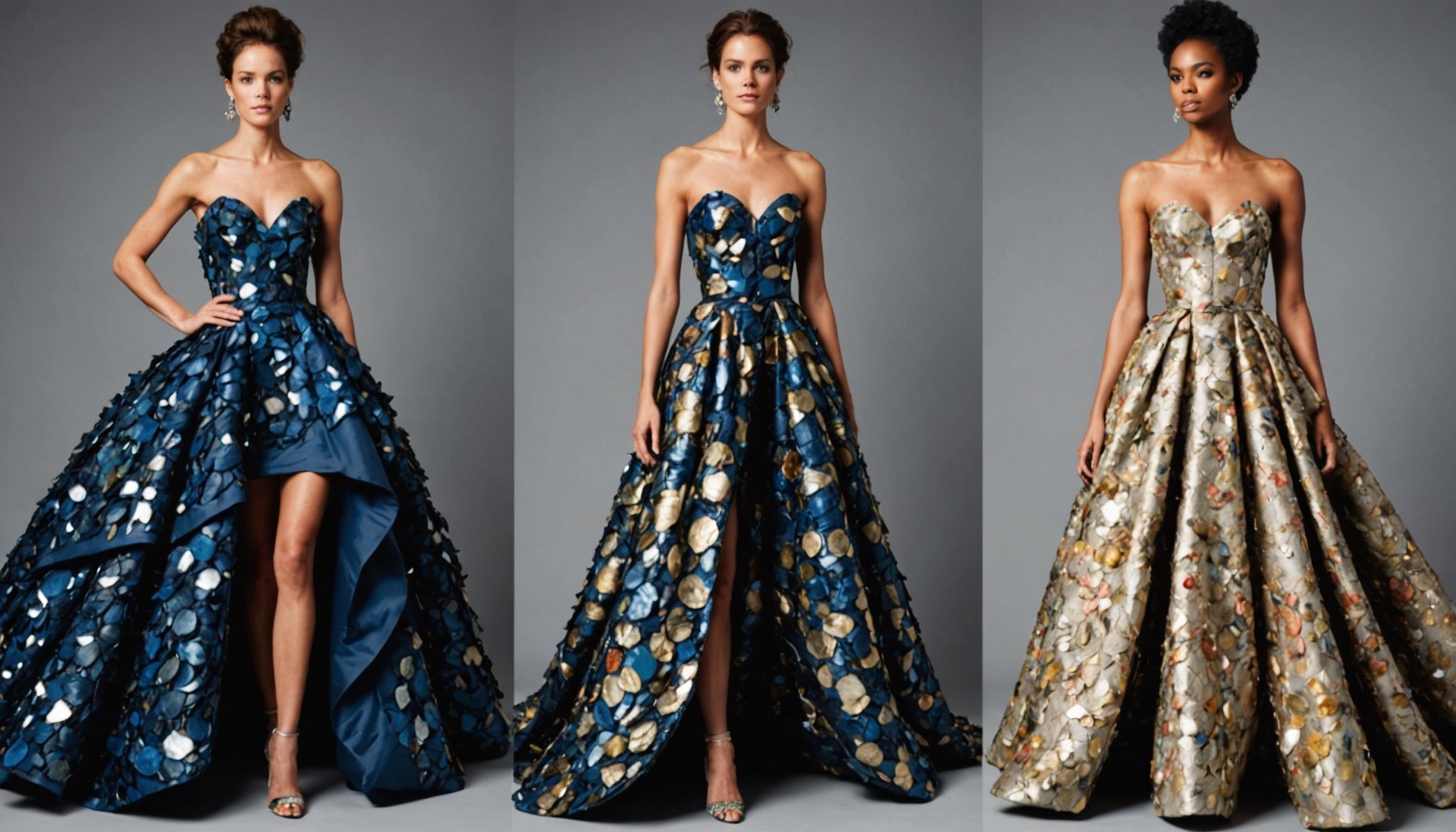Overview of Sustainable Fashion in Britain
In recent years, sustainable fashion has emerged as a significant trend within the British fashion scene. Pioneering British designers focus on creating environmentally friendly garments that not only resonate with eco-conscious consumers but also pave the way for a more sustainable future. This movement emphasises the use of recycled materials, aiming to reduce the fashion industry’s detrimental environmental footprint.
Designers are now integrating innovative techniques to repurpose materials in the crafting of elegant evening gowns. By utilising recycled materials, these gowns rival traditional designs in both style and sophistication while remaining environmentally responsible. This approach significantly reduces waste and lowers the demand for raw resources, contributing to a circular economy in fashion.
Also to see : Elevate Your Spring Style: Creative Ways to Blend Classic English Floral Patterns into Your Wardrobe
Statistics underline the necessity for such measures: traditional fashion practices contribute around 10% to global pollution, highlighting the urgent need for an industry shift towards sustainability. The use of recycled materials significantly reduces energy and water consumption, making it a crucial step in minimizing the sector’s environmental impact.
As British designers continue to spearhead sustainable fashion, their efforts inspire a broader cultural shift, encouraging consumers to make more informed and responsible purchasing decisions. This transformative approach promises to reshape the future of fashion, fostering a more sustainable and conscientious industry.
Additional reading : Explore Hidden Gems: Your Ultimate Guide to Unique Handcrafted Jewelry in the UK
Profiles of Innovative British Designers
Exploring the world of British fashion designers unveils a tapestry of innovation and creativity. These designers are at the forefront in combining elegance with sustainability, particularly through the craft of evening gowns.
Designer Spotlight: Stella McCartney
Stella McCartney is renowned for her commitment to eco-friendly fashion. Her design philosophy revolves around a fusion of style and ethical responsibility. McCartney creates distinctive evening gowns using recycled materials without compromising on chicness, showcasing a vibrant representation of her sustainable approach. Within her creative process, she relies on innovative materials like plant-based fabrics and ensures ethical sourcing throughout her supply chain.
Designer Spotlight: Vivienne Westwood
Vivienne Westwood’s signature styles often involve bold silhouettes crafted with eco-friendly fashion principles. Known for pioneering sustainable design in high fashion, Westwood implements unconventional techniques in her evening gowns, utilizing reclaimed fabrics. Her impact on the sustainable fashion movement is profound, advocating for climate-positive practices while maintaining her avant-garde aesthetic.
Designer Spotlight: Christopher Raeburn
Christopher Raeburn prioritizes sustainability in his collections, focussing on creativity through recycling. His approach to evening gowns exemplifies a balance of eco-conscious design with bold fashion statements. Consumer response to his work is overwhelmingly positive, highlighting an increasing desire for eco-friendly fashion in high-end garments. Raeburn aims to continue championing sustainability in future fashion endeavors.
The Role of Recycled Materials in Evening Gown Production
Evening gown production is experiencing a transformation with the introduction of recycled materials, as designers strive for sustainable elegance. Various recycled materials are being embraced in gown production, including recycled polyester, which is derived from plastic bottles, and recycled cotton, a fabric made from repurposed garment scraps. Another notable innovation is the use of recycled nylon, often sourced from discarded fishing nets, which provides a durable yet luxurious fabric option.
The use of recycled materials offers significant benefits for designers and consumers alike. Designers enjoy the opportunity to create environmentally-conscious collections, aligning with the increasing demand for sustainable fashion. This shift not only reduces the environmental impact but also attracts eco-aware consumers who are keen to make responsible purchasing decisions. For consumers, gowns crafted from sustainable textiles ensure they can contribute towards a healthier planet without compromising on style or quality.
Case studies further highlight the potential of recycled materials. The ‘Ethereal Collection’ by a leading fashion house, for example, features gowns crafted from recycled polyester, showcasing how revived textiles can form stunning eveningwear. These gowns stand as a testament to the harmonious blend of luxury and sustainability in modern fashion.
The Environmental Impact of Sustainable Choices
With the growing awareness of climate change, many consumers are becoming eco-conscious, impacting their approach to fashion. Traditional fashion practices, including fast fashion, rely heavily on resources and emit significant pollution. This not only raises environmental concerns but also highlights the need for sustainable alternatives.
Sustainable fashion addresses these concerns by minimizing waste and using eco-friendly materials. It involves practices that reduce the carbon footprint, like employing organic cotton or recycled fabrics, and lessening water consumption. Such practices significantly lower the ecological impact compared to conventional methods.
Eco-conscious consumers play a pivotal role in this shift. Their purchasing decisions compel brands to adopt more fashion sustainability measures. Consumers can influence change by opting for brands that demonstrate a commitment to sustainable practices in their production processes.
Furthermore, raising awareness about eco-friendly fashion is crucial. It encourages more people to investigate the origins of their purchases. By educating others on the benefits of sustainable fashion, individuals can collectively reduce the negative environmental impact of their wardrobes.
By embracing these changes, consumers and brands alike can contribute to a more sustainable and environmentally friendly fashion industry.
Where to Discover These Designers
Exploring fashion collections of sustainable British designers has never been more accessible. Begin by visiting designer websites. Most designers maintain their own platforms, showcasing exclusive pieces and offering a deeper insight into their creative processes. Furthermore, these sites may include links to their social media, providing glimpses of their latest work and sustainable practices.
For a more curated shopping experience, sustainable boutiques are recommended. These boutiques often emphasize eco-friendly fashion brands, making it easy to support designers committed to environmental responsibility. Frequently updated with new collections, they serve as hubs for discovering fresh and innovative sustainable designs.
Additionally, numerous online platforms aggregate these designers, allowing for easy comparison and purchase. Sites dedicated to sustainable fashion provide comprehensive listings of designers and their fashion collections, along with recommendations for further engagement. They often house vibrant communities of like-minded individuals eager to discuss and promote ethically produced fashion.
- Recommendations:
- Browse designer websites for exclusives.
- Visit sustainable boutiques for curated selections.
- Join online platforms focused on eco-friendly fashion for community insights.
By exploring these avenues, you can contribute to the growth of sustainable fashion while enjoying unique styles.











